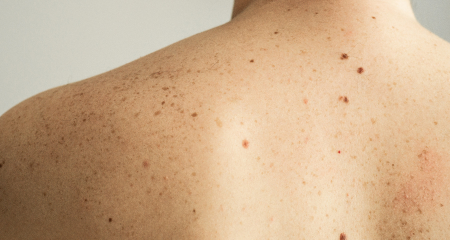
Skin cancer is the most common type of cancer in the United States, with one in three Texans affected. At Northstar Dermatology, our board-certified dermatologists specialize in comprehensive skin cancer care, offering full-body screenings for early detection and expert surgical treatment of all skin cancer types. Prevention and early detection are crucial, and our team is committed to educating patients on strategies to reduce their risk.
While melanoma is the most recognized form of skin cancer, it is actually less common than other types. Basal cell carcinoma and squamous cell carcinoma impact significantly more individuals than melanoma.
Basal Cell Carcinoma (BCC) is the most common type of skin cancer. Although it is rarely life-threatening, untreated BCC can grow and spread into surrounding tissues. BCC is often caused by prolonged UV exposure from sunlight or indoor tanning. Individuals with fair skin, a history of sunburns, red hair, or freckles are at a higher risk of developing BCC. Those who work outdoors or live in sunny regions year-round are also at an increased risk. If you notice a spot that isn’t healing or a persistent scaly patch, it may be a sign of BCC. Consult a board-certified dermatologist for a professional evaluation.
Squamous Cell Carcinoma (SCC) is the second most common type of skin cancer, typically resulting from UV exposure due to sunlight or indoor tanning. Unlike Basal Cell Carcinoma, SCC has the potential to spread to other parts of the body, making early treatment essential to prevent metastasis. Fortunately, SCC tends to grow slowly, but it’s crucial to address it promptly. SCC may appear as a non-healing spot, a persistent scaly patch, or a wart-like growth. If you notice any of these signs or observe any new or changing spots, schedule an evaluation with a board-certified dermatologist.
The physicians at Northstar Dermatology specialize in the surgical treatment of all types of skin cancer. The most common approach is surgical excision, where the dermatologist removes the cancerous tissue along with a margin of surrounding tissue to ensure complete clearance. The area is then closed with sutures, and some downtime is necessary, including temporary restrictions on lifting and physical activities for a few weeks.
For more superficial or early-stage skin cancers, non-surgical treatments may be an option, including procedures like Electrodessication and Curettage or chemotherapy injections. In cases involving larger skin cancers or cancers in cosmetically sensitive areas, your dermatologist may refer you to a Mohs surgeon for specialized removal.
A Skin Cancer Screening is a comprehensive, head-to-toe examination to identify any suspicious spots or potential skin cancers. After you are comfortably placed in a gown, our specialist will carefully assess your skin, noting any “spots” present. Certain lesions may be examined more closely using a dermatoscope, a specialized magnifying tool that provides a detailed view of the skin’s characteristics.
If any lesions appear suspicious for skin cancer or other abnormalities, a biopsy may be recommended to confirm the diagnosis. A biopsy is a quick procedure where a small sample of the lesion is removed and sent to a lab for analysis. During the screening, pre-cancerous spots (such as actinic keratoses) and certain benign lesions may also be treated if necessary.
Skin Cancer Screenings focus specifically on identifying potential skin cancers and educating patients about the findings. Other concerns, like acne or rashes, usually require a separate appointment to allow dedicated time for assessment and treatment.
Skin cancer screenings are beneficial for everyone, no matter the skin type. However, some people have certain features or factors which increase the risk for developing skin cancer:
• Family history of skin cancer
• Personal history of sunburns, especially blistering sunburns
• Personal history of extended sun exposure (working outdoors, outdoor sports, outdoor
recreation such as boating, pool, beach, etc.)
• Personal history of indoor tanning
• Fair complexion
• Red hair or light hair
• A plethora of moles
If any of the above are applicable to you, it is imperative that you request a head-to-toe skin cancer screening